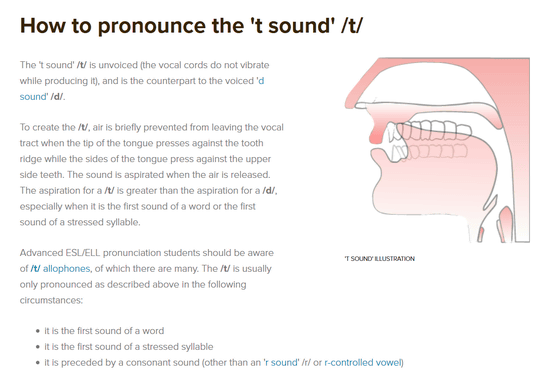A report that the pronunciation of the English 't' is changing among young people, how is it changing?

In some junior high school and high school English classes, I'm sure some people couldn't get used to the pronunciation of English that is completely different from Japan. Regarding the pronunciation of such English, 'Minyon
Have You Noticed People Not Pronouncing Their T's? | Grammar Girl
https://www.quickanddirtytips.com/education/grammar/pronouncing-T
The consonant 't' often appears in English, such as Butter, Kitten, and Water. The general pronunciation of the 't' consonant in English is the same as 'tachitsutet' in Japanese, and is phonetically classified as ' unvoiced gum plosive .' Specifically, the sound produced when the tip of the tongue is attached to the gums and the tongue is released at a stretch while allowing air to pass without vibrating the vocal cords is the 't' consonant in English.
Pronounce t sound — Pronuncian: American English Pronunciation
https://pronuncian.com/pronounce-t-sound

Also, in American English, the 't' consonant is often pronounced by sticking the tongue relatively behind the gums. For example, 'Water' is not 'water' but 'waller', and 'Button' is not 'button.' The 't' consonant in a word is often transformed into a sound that is classified as a ' gingival repellant,' as pronounced as 'boran.'
But over the last decade, Fogerty says that the pronunciation of the 't' consonant isn't an unvoiced gum burst or gum repellency, but rather when the vocal cords in the back of the throat are closed tightly to stop airflow and suddenly open. It has been pointed out that it is changing to ' glottic closing sound ', and this phenomenon is called 'glotticization'.
About 50 seconds in the following movie, you can hear the pronunciation of English 'Button' using the glottal stop sound. You can see that the 't' consonant should be pronounced, but it sounds like a little breath. According to Fogerty, an example of pronouncing words such as Butter and Important using the glottal stop has been confirmed in Ohio, in the northeastern United States.
[ʔ] unvoiced unaspirated radical glottal stop-YouTube
The glottalization of the 't' consonant is believed to be the pronunciation originally used by British male workers. However, it was reported in 1982 that somehow working-class pronunciation became visible among younger British English speakers of the upper class. In 2015, Guardian, a large British letter, predicts that there is a good chance that the glotification of the't 'consonant will eventually become the standard British pronunciation.
The glottalization of the 't' consonant began to be pointed out in the United States in the late 2000s, and in a 2006 paper summarizing the dialect survey of Vermont in the eastern United States, ' , And Ireland, but not so often in the United States, 'and the glottalization of the' t 'consonant became particularly prevalent among Vermont residents, especially the younger generation. It has been reported.
In addition, according to a 2009 study (PDF file) , young female English speakers not only in the eastern United States but also in the western United States had a glottalization of the 't' consonant, which included Mountain and Vermont ( It was discovered that he pronounced the 't' consonant of (Vermont) as if swallowing deep inside his throat. It is said that a similar example was confirmed in 2012, and Fogarty points out that the glottalization of the 't' consonant is becoming common in the United States, especially in the younger generation.

'I don't know why the glottalization of the't 'consonant is widespread among young people,' Fogerty said. 'The standard pronunciation of the whole region, and even the whole country, is innumerable. It's a gradual change that's affected by factors such as, which may be offensive to some people, but someday we may all say it that way. '
In addition, it seems that not only English but also Japanese pronunciations are changing little by little over time, and there is a study that 'vowel pronunciations in Tokyo are changing from generation to generation.' pronunciation is that 'has changed pointed out there is like.
Related Posts:







